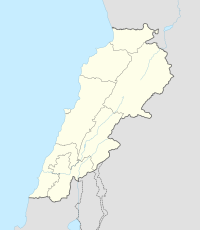Apheca
|
Afqa Apheca, Afeca, Afka |
|
|---|---|
| Village | |

Afka From Qartaba
|
|
| Country |
|
| Governorate | Mount Lebanon Governorate |
| District | Jbeil District |
| Area | |
| • Total | 9.34 km2 (3.61 sq mi) |
| Elevation | 1,200 m (3,900 ft) |

The Afqa Grotto
|
|
| Location | 71 kilometres (44 mi) northeast of Beirut |
|---|---|
| Region | Jbeil District |
| Coordinates | 34°04′09″N 35°53′10″E / 34.069167°N 35.886111°E |
| History | |
| Cultures | Roman, Ancient Greece, Phoenicia |
| Site notes | |
| Condition | Ruins |
| Public access | Yes |
Afqa (Arabic: افقا; also spelled Afka) is a village and municipality located in the Jbeil District of the Mount Lebanon Governorate, 71 kilometres (44 mi) northeast of Beirut in Lebanon. It has an average elevation of 1,200 meters above sea level and a total land area of 934 hectares. Its inhabitants are predominantly Shia Muslims.
Known in ancient times as Apheca or Afeka, the word can be interpreted as "source", is located in the mountains of Lebanon, about 20 kilometres from the ancient city of Byblos, which still stands just east of the town of Qartaba. It is the site of one of the finest waterfalls in the mountains of the Middle East, which feeds into the Adonis River (known today as Abraham River or Nahr Ibrahim in Arabic), and forms Lake Yammoune, with which it is also associated by legend.
In Greek mythology Adonis was born and died at the foot of the falls in Afqa. The ruins of the celebrated temple of Aphrodite Aphakitis— the Aphrodite particular to this site— are located there.Sir Richard Francis Burton and Sir James Frazer further attribute the temple at Afqa to the honouring of Astarte or Ishtar (Ashtaroth). Afqa is aligned centrally between Baalbek and Byblos, pointing to the summer solstice sunset over the Mediterranean. It is from Byblos that the myth was told of a mystical that came ashore containing the bones of Osiris. The ark became stuck in a swamp until Isis found it and carried it back to Ancient Egypt.
...
Wikipedia

